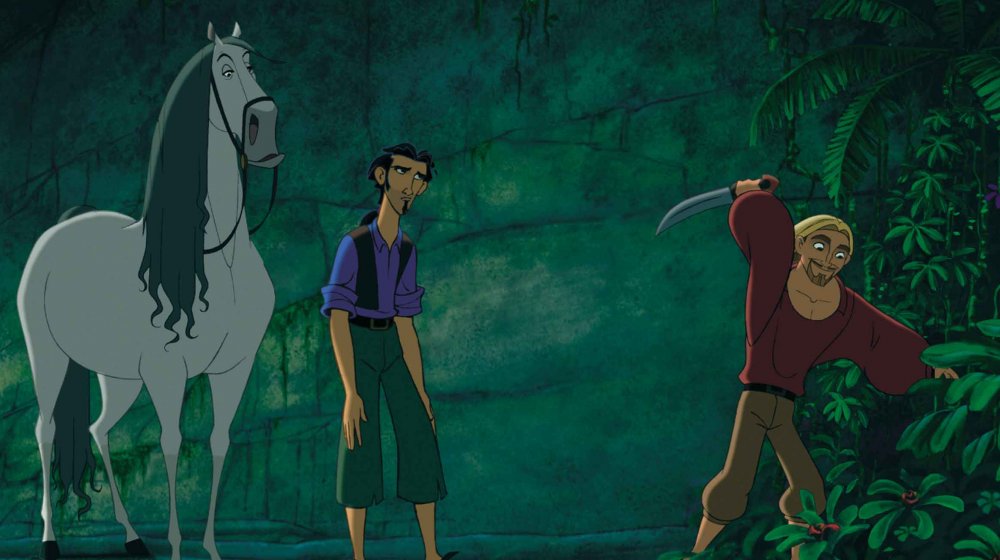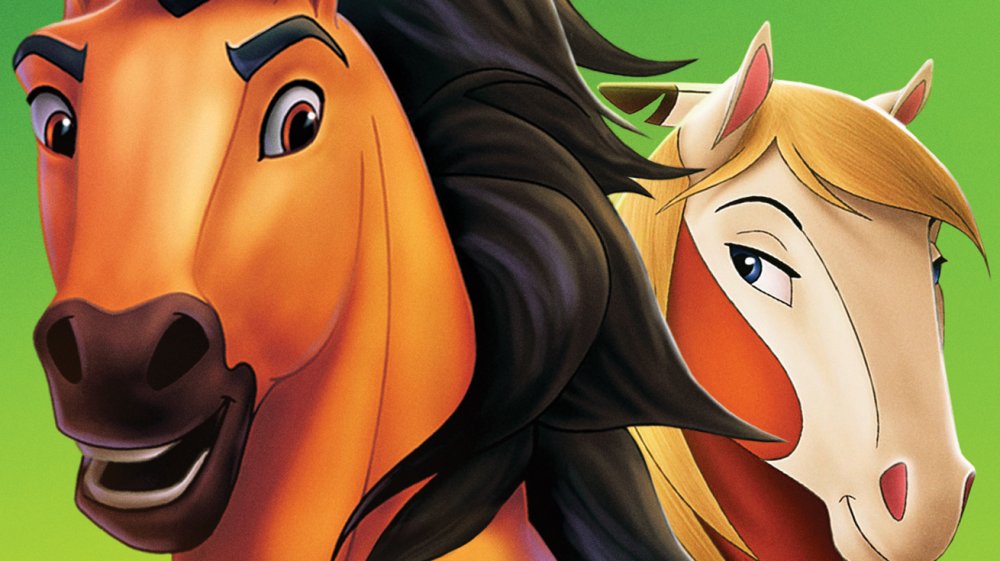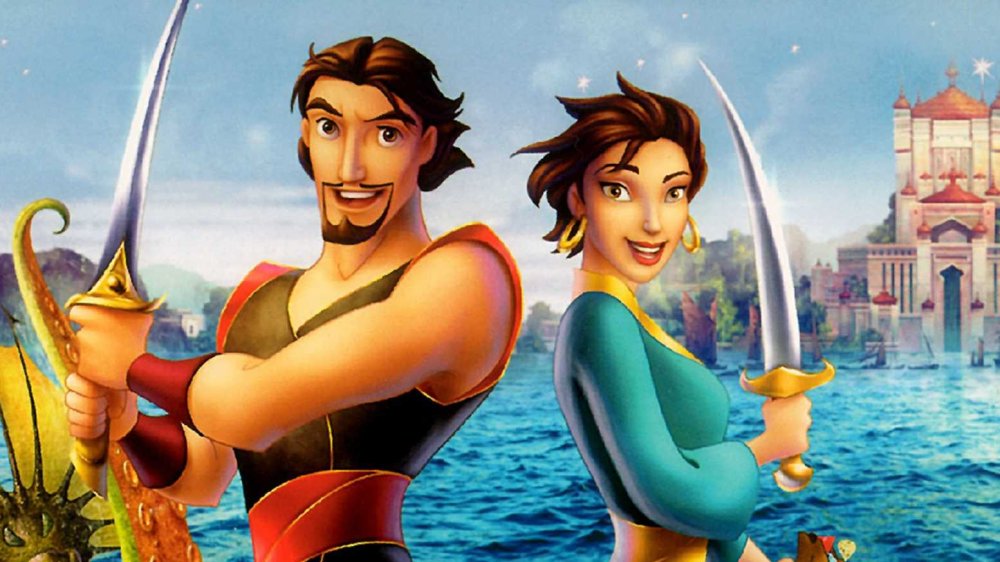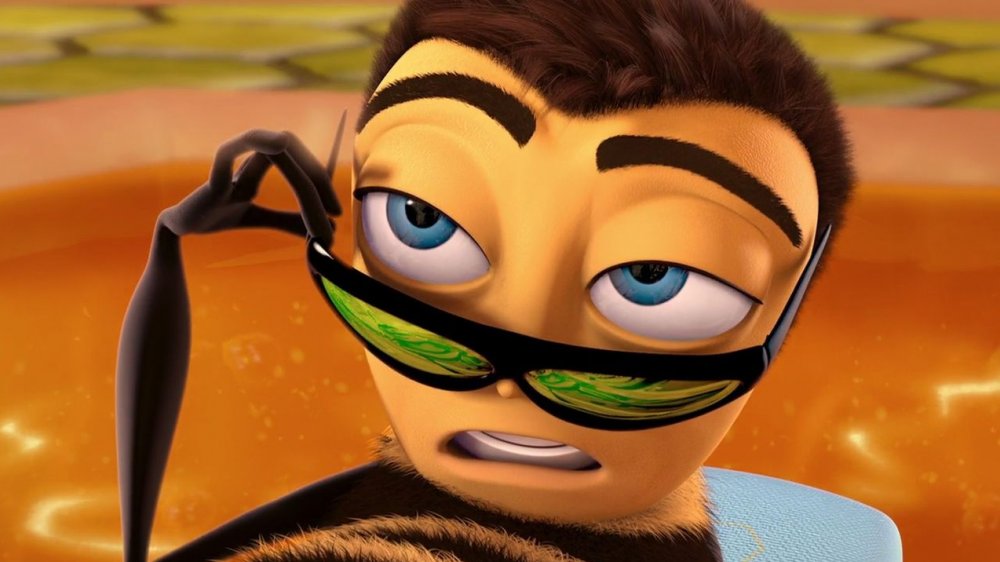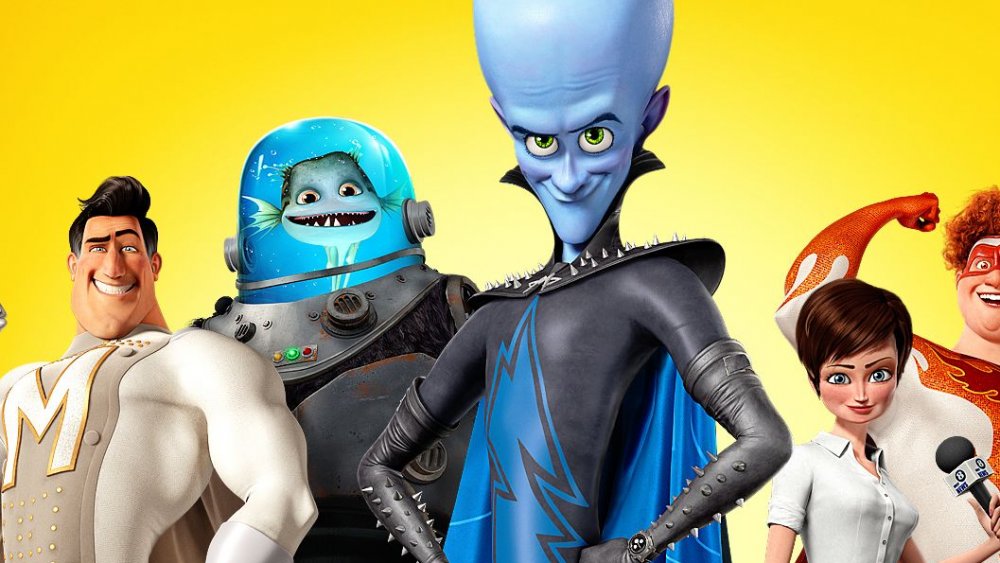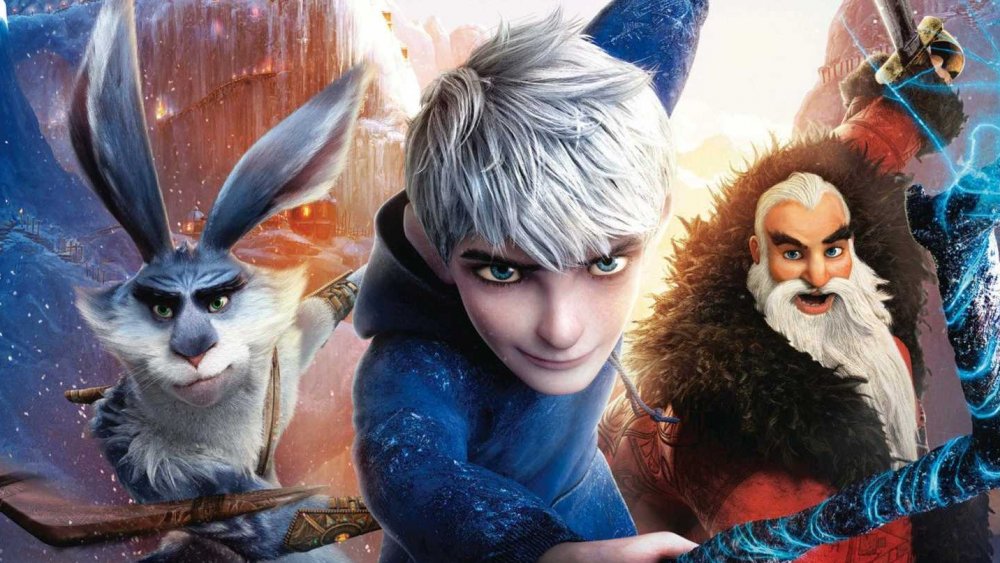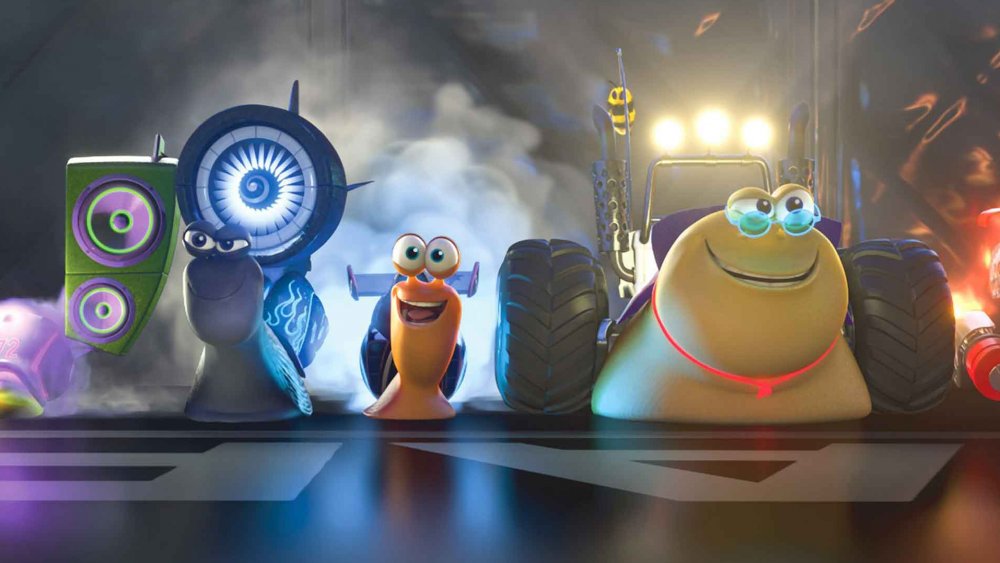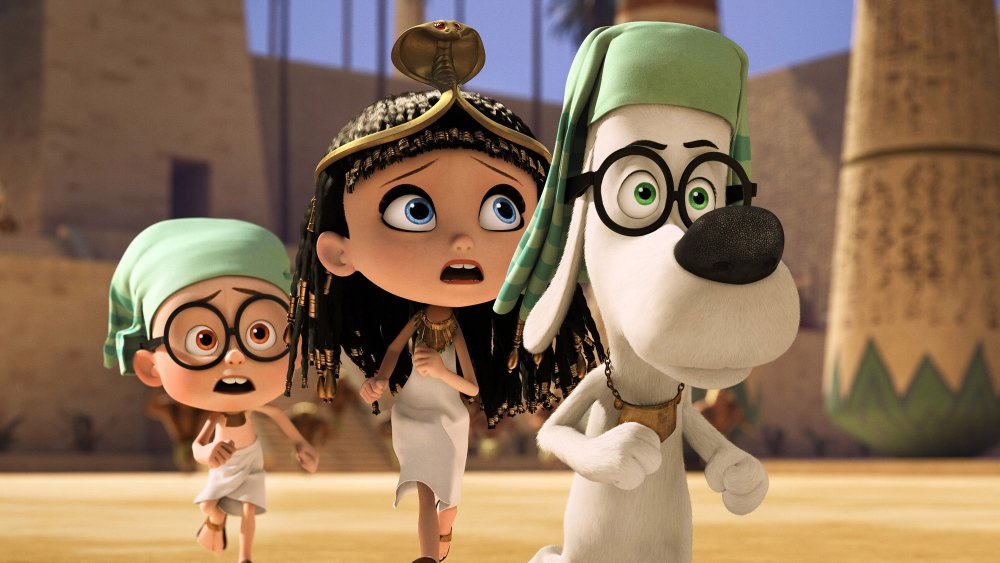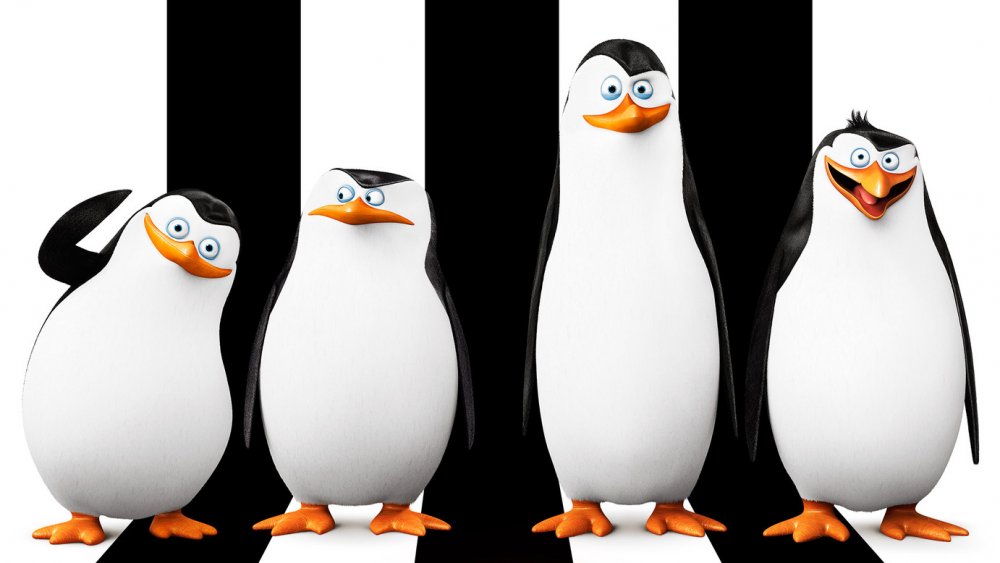The Real Reason These DreamWorks Animation Movies Bombed
For 12 years, from 2004 to 2016, the highest-grossing animated movie at the domestic box office did not belong to Disney. Despite the studio's domination in the world of family-friendly animation, it was competitor DreamWorks Animation that secured that honor thanks to the mammoth $441 million domestic haul of Shrek 2. Such a feat reinforced that DreamWorks had managed to become a titan in a domain once ruled exclusively by Disney. In the years since Shrek 2, Disney titles like Finding Dory and Incredibles 2 have surpassed its domestic gross. However, DreamWorks has still managed to reaffirm their high stature thanks to box office hits like Kung Fu Panda and How to Train Your Dragon.
Still, no animation studio has a bulletproof box office track record. Even Disney has released box office duds like The Black Cauldron. So it is with DreamWorks Animation, which has seen its fair share of box office bombs in the decades it has been producing features. Some of these films underperformed merely due to poorly timed release dates. Others suffered far worse financial fates due to large array of issues. Whatever the problems were, even the studio that turned a flatulent ogre into a beloved icon couldn't turn these animated movies into box office hits.
The Road to El Dorado
"All will be revealed, on the trail we blaze." So goes Elton John's The Road to El Dorado song "The Trail We Blaze." For the DreamWorks cartoon The Road to El Dorado, the trail it blazed was fraught with problems even before its theatrical release. As chronicled in a piece by the Los Angeles Times, production problems for El Dorado included its original directors, Will Finn and David Silverman, being jettisoned, the lead characters getting overhauled, and the original adult tone being trimmed down to fit into a PG rating. The issues didn't end once the film was released. On a budget of $95 million, El Dorado made a dismal $50.8 million domestically, per The Numbers. Unlike some animated family movies, overseas grosses couldn't salvage El Dorado, as it only grossed $14.9 million in international territories. CBS News would later estimate the film lost at least $29.3 million for DreamWorks.
It's taken some distance from El Dorado's release to fully understand why it bombed so hard. In April 2020, Polygon's retrospective on El Dorado reflected on the film's style of comedy being ahead of its time as a prime reason why it bombed. Meanwhile, Comic Book Resources observed how the hand-drawn animated film debuting just as computer-animated films were taking off didn't do it any favors. Whatever the reasons for its failure, El Dorado fell far short of blazing a successful trail at the box office.
Spirit: Stallion of the Cimarron
Compared to other hand-drawn animated movies from DreamWorks, the box office haul of Spirit: Stallion of the Cimarron looks practically peachy. For one thing, Spirit didn't nearly capsize the company like fellow hand-drawn DreamWorks films like El Dorado or Sinbad did. Still, clearing that low bar didn't make Spirit a box office hit. Released in May 2002, Spirit failed to generate a profit on its $80 million budget. According to The Numbers, Spirit grossed just $73.2 million domestically and only generated $33.3 million overseas.
The film was later dubbed a "box office dud" by CNN, and future DreamWorks movies shifted away from the more somber tone of Spirit. It's easy to blame a competitive marketplace for Spirit's box office struggles. After all, it opened the same month as box office juggernauts Spider-Man and Attack of the Clones. However, other animated movies, like Sing, have managed to thrive in the face of new Star Wars or superhero movies. Instead, Spirit was held back by a premise that didn't have the kind of all-ages appeal that have has driven the biggest DreamWorks Animation movies. Whereas teenagers and adults were a primary audience for the studios Shrek or Kung Fu Panda movies, 80 percent of Spirit's opening weekend patrons were families, per Box Office Mojo. Without that all-ages appeal, Spirit was doomed to be one of the lower-grossing titles in the DreamWorks Animation catalogue. At least it came in above The Road to El Dorado.
Sinbad: Legend of the Seven Seas
Sinbad is an important film in the history of DreamWorks Animation. For one thing, it served as the studio's last foray into hand-drawn animation. It's no surprise that DreamWorks abandoned the format, given that Sinbad wasn't just a box office underperformer. Sinbad was an outright financial debacle.
Sinbad's box office run kicked off with a $6.8 million opening weekend. Not only did this gross put Sinbad behind newcomers like Terminator 3: Rise of the Machines and Legally Blonde 2: Red, White & Blonde, but it also opened below the sixth-weekend haul of Finding Nemo. Any hopes that Sinbad's domestic run would improve from there would go unfulfilled. According to The Numbers, Sinbad grossed just $26.5 million domestically and $54.3 million internationally on a $60 million budget. A few weeks after its release, DreamWorks Animation co-founder Jeffrey Katzenberg told The New York Times that the studio would no longer produce hand-drawn animated projects in the wake of Sinbad's failure. Computer-animated features like Shrek and Madagascar have proven to be the norm for DreamWorks ever since.
Two years after its theatrical release, Sinbad's exact financial losses were made public when, per the Los Angeles Times, DreamWorks co-founder David Geffen revealed that the project lost $125 million. In the process, the heroic Sinbad nearly bankrupted the studio. Given those kind of losses, it's no surprise that Sinbad ended up being a pivotal turning point for DreamWorks Animation as a company.
Flushed Away
For their third collaboration, DreamWorks Animation and Aardman went where no other Aardman feature had gone before: computer animation. The characters of Flushed Away would still resemble the stop-motion-animated characters Aardman was known for, but they would be entirely computer-generated creations. Hopes that this would lead Flushed Away to grosses that were more Madagascar ($193 million domestic) than Wallace & Gromit: The Curse of the Were-Rabbit ($56 million domestic) went unfulfilled.
Flushed Away grossed just $64.7 million domestically, according to The Numbers. That's the second-lowest domestic sum for a computer-animated DreamWorks movie ever. Even with an additional $114.7 million overseas, Flushed Away grossed nowhere near enough to recoup its $149 million budget. Flushed Away's low box office was attributed to 2006 being packed with other computer-animated family films, ranging from Cars to The Ant Bully. Ironically, Aardman's attempt to follow the crowd with the computer-animated Flushed Away ditched a key element (stop-motion animation) that could have made it stand out in a crowded marketplace.
The ripple effects of Flushed Away's box office performance were enormous. For one thing, DreamWorks and Aardman went their separate ways in January 2007, long before their initial five-film deal from 1999 was completed. A month later, DreamWorks reported that the project had led to a $109 million loss for the company, per the Los Angeles Times. Aardman ventured into a new medium of animation with Flushed Away. However, that artistic boldness didn't yield a successful box office haul.
Bee Movie
Prior to its release, Bee Movie was given a massive marketing campaign. Kicking off 12 months before its premiere with a live-action teaser, subsequent publicity efforts included Jerry Seinfeld gliding above the Cannes Film Festival in a bee outfit. With all the pre-release hubbub, it was clear DreamWorks Animation was hoping the combination of Jerry Seinfeld and Bee Movie would be as lucrative as the pairing of Mike Myers and Shrek or Ben Stiller and Madagascar. Unfortunately, Bee Movie ended up going in a much more problematic financial direction.
Premiering in November 2007, Bee Movie grossed just $126.6 million domestically. Exempting Flushed Away, Bee Movie was the first CGI movie from DreamWorks to make under $150 million domestically. Even with another $160.9 million internationally, Bee Movie fell short of doubling its $150 million budget. Film School Rejects would later describe the box office run as "subpar," and the Los Angeles Times would later refer to it as one of DreamWorks' most notable "flops."
Even with all of its marketing, Bee Movie never became the next big animated hit. The allure of merging Jerry Seinfeld with animated family movies just wasn't as widely appealing as it seemed on paper. Still, unlike many titles on this list, Bee Movie did manage to secure an unexpected a second life through increasingly bizarre internet memes.
Megamind
Superhero movies have become a reliable source of box office success in recent years. However, the same cannot be said for superhero movie parodies. Box Office Mojo once observed that "the subgenre is riddled with box office failures." Titles like Mystery Men, Superhero Movie, and My Super Ex-Girlfriend bear this observation out. Unless the titles hail from the Incredibles franchise, audiences just aren't interested in this subgenre. Further evidence of this trend was found in the DreamWorks Animation production Megamind. Though it proved more popular than most superhero movie parodies, it still proved to be one of the lowest-grossing entries in the DreamWorks Animation canon.
Released in November 2010, Megamind had to contend with a number of other family-skewing titles in its initial theatrical release, particularly a new Harry Potter movie and Tangled. After the dust settled, Megamind had a $148.4 million domestic gross, per The Numbers. The film also failed to make an impact overseas, with its international box office woes being attributed to its human-centric cast. Though nowhere near as catastrophic as Sinbad, Megamind was still a disappointment for DreamWorks. In early 2011, the film was dubbed an underperformer by Wall Street Journal analysts, and a year later, Katzenberg used Megamind as an example of the kind of satirical comedy that the studio would be avoiding in the future. DreamWorks Animation has beaten the odds in many instances over the years. However, even they couldn't turn a non-Incredibles superhero parody into a box office juggernaut.
Rise of the Guardians
On the outside, Rise of the Guardians looked like a sure bet for box office success. Not only did it have big stars in its voice cast (Chris Pine, Hugh Jackman, and Alec Baldwin were among the actors), but its lead characters included iconic figures like Santa Claus and the Tooth Fairy. However, all these promising ingredients didn't help Guardians live up to its potential. In fact, it ended up being a significant box office dud for DreamWorks. Guardians made only $103.4 million domestically, the lowest box office gross for a DreamWorks feature in six years. Budgeted at $145 million, Guardians ended up losing $83 million for the studio, per The Guardian.
Shortly after Guardians premiered in November 2012, Uproxx unpacked the various reasons why the film so significantly went askew. Among the problems Guardians faced were reviews that were "fine" rather than raves, the fact that the marketing was aimed at children, and audiences' discomfort at such radically altered visions of characters like Santa Claus. These sentiments were reflected by Rolling Stone, which also noted that Guardians faced formidable competition for family moviegoers over Thanksgiving 2012 from Disney Animation's Wreck-It Ralph and especially PG-rated sleeper hit Life of Pi. Guardians was supposed to be the big tentpole hit for Thanksgiving 2012. However, it ended up getting outmatched by the cheaper but more broadly appealing Life of Pi. In the process, Guardians hit the kind of box office lows DreamWorks hadn't seen since Sinbad.
Turbo
After turning a panda who does kung fu into a box office sensation, DreamWorks Animation went back to the underdog animal well for Turbo. This time, the focus would be a on a snail (voiced by Ryan Reynolds) who gains super-speed abilities and proceeds to compete in the Indy 500. Though its premise certainly wasn't something you see every day, Turbo failed to leave much of an impression on the box office when it debuted in July 2013.
According to The Numbers, Turbo grossed just $83 million in its domestic haul and $203.8 million internationally. This made Turbo only the second CGI DreamWorks Animation title to gross under $100 million domestically. As a result, DreamWorks Animation had to take another write-down on a would-be franchise. Three months after its release, Jeffrey Katzenberg said to The New York Times that Turbo's underperformance was due to intense competition from other kids' movies in the summer of 2013. Specifically, the film opened two weeks after Despicable Me 2 and two weeks prior to The Smurfs 2. Squeezing an original kids' movie in between two high-profile sequels turned out to be a major scheduling miscalculation. The true impact of that mistake would be felt in February 2014, when Katzenberg announced that Turbo would result in a $13.5 million loss for the company. While Turbo's protagonist beat the odds to compete against racecars, Turbo the movie was crushed by the competition.
Mr. Peabody & Sherman
In the 1960s, cartoonist Jay Ward was the creator of a variety of animated characters that proved to be incredibly popular television staples. In fact, they proved so enduring in their appeal that it was only a matter of time before they were brought to the big screen. Among Ward's many creations were Mr. Peabody and Sherman, who got their own DreamWorks Animation movie in March 2014. Whereas prior feature adaptations of Jay Ward characters, like Dudley Do-Right and The Adventures of Rocky & Bullwinkle, were live-action films, Mr. Peabody & Sherman was a fully computer-animated affair. A trait Mr. Peabody & Sherman did share with those preceding Jay Ward adaptations, though, was being a box office dud.
After grossing $111.5 million domestically and $158.3 million internationally on a $145 million budget (per The Numbers), DreamWorks Animation announced they would be taking a $57 million write-down on the film. The reason for Mr. Peabody & Sherman's failure has been widely attributed to its odd mixture of a tone that appealed just to children while starring characters only older adults would know or care about. Others have observed that Mr. Peabody & Sherman suffered from the shifting moviegoing tastes of family audiences. Whatever the reasons for its financial shortcomings, Mr. Peabody & Sherman followed in the footsteps of box office flops Dudley-Do-Right and The Adventures of Rocky & Bullwinkle to reaffirm that the characters of Jay Ward just aren't a major box office draw.
The Penguins of Madagascar
One common element across these box office flops is that, up to this point, they've all been original movies. However, given how often they produce sequels and spin-offs, it was inevitable that one of these follow-ups would eventually come up short for DreamWorks Animation. Such an event finally happened with the November 2014 feature Penguins of Madagascar. This title becoming a box office dud proved an especially surprising development, given how the three preceding Madagascar movies had performed. Each Madagascar movie had made more than the last at the worldwide box office, with Madagascar 3: Europe's Most Wanted amassing a whopping $746.9 million worldwide just two years prior to Penguins of Madagascar debuting.
Penguins, meanwhile, grossed just $83.4 million domestically and $366.9 million worldwide, roughly half of Madagascar 3's worldwide box office total. Following Turbo, it was the second non-Flushed Away CGI title from DreamWorks to gross under $100 million domestically. Penguins falling so short at the box office mostly had to do with its limited appeal to mostly children, with Deadline calling them the "driving force" of the movie's box office take after its opening weekend. Spin-off movies also generally have a hard time at the box office. DreamWorks' own Puss in Boots was down $85 million from the lowest-grossing Shrek movie domestically, for example. Even given those factors, it's still surprising, considering how lucrative the Madagascar movies were, that those penguins couldn't pull off the mission of launching a successful spin-off.

